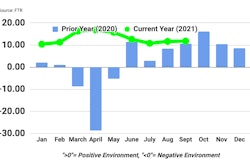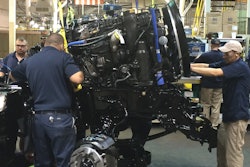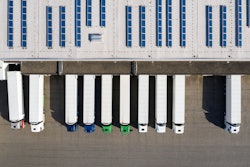After bottoming out in the midst of the COVID-19 pandemic in 2020, diesel fuel prices have climbed steadily the last 12 months, rising from the 2020 national average low of $2.372 per gallon during the week ending Nov. 2, 2020, to the 2021 high-to-date national average of $3.734 per gallon during the week ending Nov. 15, 2021.
The biggest catalyst behind rising fuel costs is the price of crude oil, according to Tom Kloza, global head of energy analysis for Oil Price Information Service (OPIS). The Department of Energy, in its November Short-Term Energy Outlook, said Brent crude oil spot prices averaged $84 a barrel in October 2021, up $9 a barrel from September, and up $43 a barrel from October 2020.
“I think most of it has had to do with crude,” Kloza said. “There will be a lot of things blamed; there’ll be politics blamed or whatever, but it’s the price of crude.”
Kloza noted that the last time crude prices were this high – about seven or eight years ago – diesel prices were up but gasoline wasn’t as high as it is today. He said that’s due in part to additional expenses in the supply chain.
“There’s probably around 750,000 barrels a day – or about 5% less refining capacity – than there was seven years ago,” he said. “And driver shortages … tanker driver shortages have really manifested themselves in markets.”
He also noted that payrolls for employees at truck stops and gas stations are higher now than they were, which is also driving up the cost of fuel.
While diesel prices have hit somewhat of a plateau in recent weeks – increasing by just 2 cents per gallon nationwide since the end of October – Kloza said the severity of the coming winter will play a large role in diesel prices over the next few months.
“[Diesel]’s really the only fuel that can be substituted when natural gas problems arise,” he said. “You’ll hear lots of different estimates of how much can be substituted in Asia or in Europe. I’ve seen it happen in the United States when we get natural gas curtailments. We have a lot of natural gas in the ground, but we don’t have a lot when you get down-state in places like Chicago and New England. Then the price can really rise exponentially, or you can be turned off of natural gas for a power plant, and when that happens, they start buying diesel.”
 Hear more about what's happening in the oil and diesel fuel markets on this week's 10-44 webisode in the video above.
Hear more about what's happening in the oil and diesel fuel markets on this week's 10-44 webisode in the video above.
Kloza, who has spent much of his career in New Jersey, said that in particularly harsh winters, the casinos in Atlantic City will have their natural gas shut off to prioritize hospitals, schools and homes. The casinos then have diesel shipped in to keep their heat on, putting a strain on diesel supply.
“If you get a vortex kind of winter, you could have incredible rises in prices in diesel,” he said.
Another factor that could keep diesel prices elevated, according to the Department of Energy, is that OPEC+ said it is committed to maintaining its scheduled production increase of 400,000 barrels of crude oil per day in December rather than increase production in response to already high crude prices and increasing demand.
Kloza said he expects more fluctuation in diesel prices over the next five months than gasoline prices, and foresees an increase to around $4 a gallon nationwide for a little while before starting to decline. As for California, which he said “marches to the tune of its own drum,” prices are likely to be around $5 a gallon.
“On a national basis, if I were setting the over/under in Vegas and it was $4, I would take the over, for at least a brief period of time,” Kloza said, "but I don’t think we’ll average those numbers for a long period.”
The Energy Department forecasts a steady decline in diesel prices throughout 2022 following a plateau in the fourth quarter of 2021. DOE forecasts the national average for retail on-highway diesel prices to average $3.39 a gallon nationally in the first quarter of 2022, falling to $3.13 a gallon nationally by the end of next year.
Will diesel shortages be a problem going forward? Find out more the video above.










